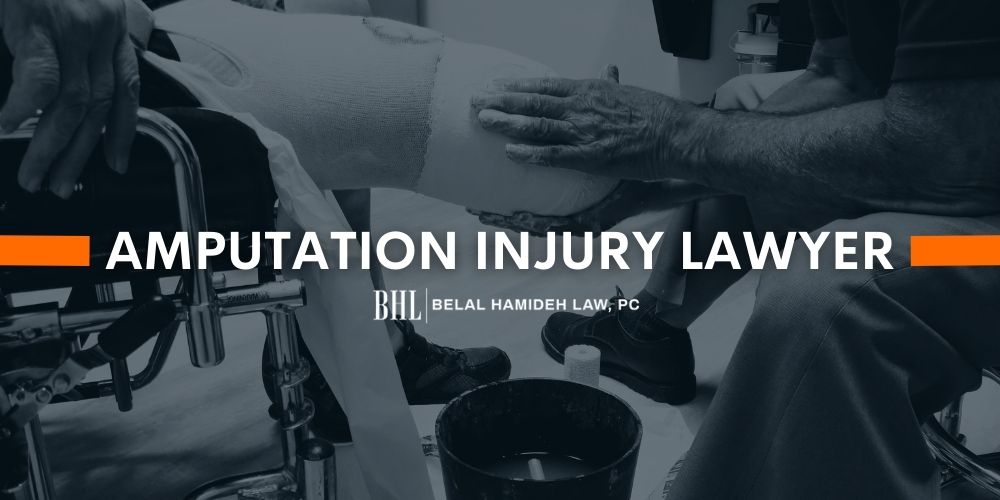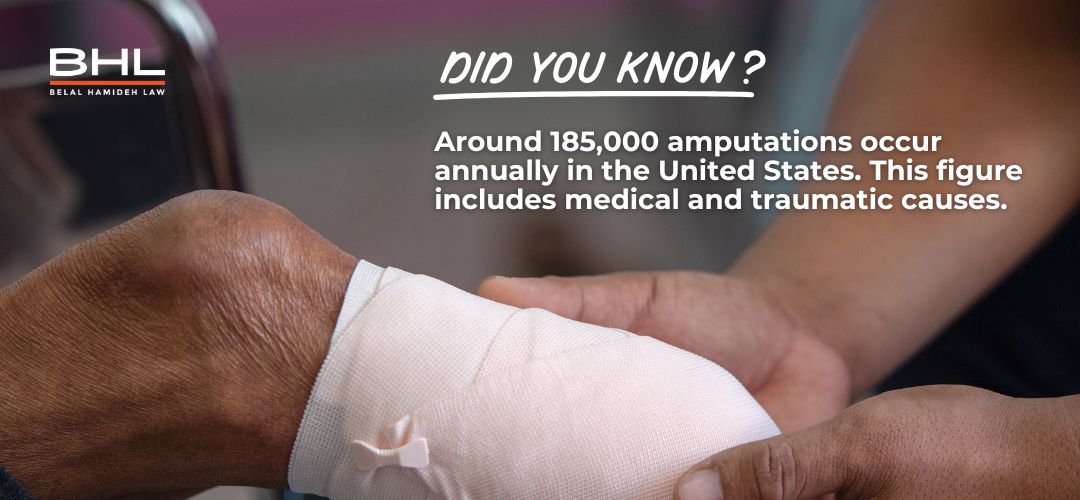
Did you have a limb removed due to the reckless or negligent actions of someone else? Has a loved one had to go through a traumatic amputation because of what another party did? Any injury can be difficult to recover fully from. Losing a limb because of what someone else did can be among the hardest challenges a person ever faces in life. If you or someone you love has had to deal with this, Belal Hamideh, a Long Beach amputation injury lawyer, can help.
Any amputation, be it partial or otherwise, is a very serious injury. If you’ve suffered a serious injury due to what someone else did, it’s worth it to reach out to an attorney with experience. We offer free consultations, so there’s no downside. You can reach us through the site or by calling.
Defining an Amputation Injury
These are injuries where, for the safety of a person, a body part has to be removed. Whether it’s a complete body part that’s removed or just part of one, both are considered amputation injuries. Like any other kind of injury and treatment, each amputation is different. In some amputation cases, a patient may only have to deal with a limited loss of use of a limb/body part. In fact, doctors may be able to reattach severed limbs.
Partial amputations tend to be defined as those where some soft tissue remains attached. Unfortunately, while these cases may seem milder than others, that does not mean that it is any simpler to reattach the part of the body that’s been severed.
With essentially any amputation injury, the recovery journey can be lengthy and difficult. Between physical therapy, negative emotional effects, the potential for infection, nerve damage, learning new ways to do previously routine actions and so much more, amputation can make life more arduous. These are all reasons why it’s so important to reach out to an attorney that can help you throughout the process.

Common Types of Amputations
Amputations typically involve either the lower extremities or the upper extremities. The former include transfemoral amputations, which are those below your hips but above your knees, often cutting through the thigh bone to complete the amputation. Other examples of these amputations are called “transtibial,” which are amputations that can preserve your knee, as they tend to be above your feet but below your knees. Partial foot amputations are what they sound like, while “digit amputations” are those involving your toes or your fingers.
Upper extremity amputations can also include digit amputations such as your fingers or thumbs, but they can also include amputating the entire arm at the shoulder by cutting through the shoulder, which is often referred to as a “shoulder disarticulation.”
Other upper extremity amputations could be performed above the elbow joint (called a “Transhumeral amputation,”) or below the elbow joint (“Transradial” amputation) or the amputation of a hand with the wrist still attached, (“Metacarpal” amputation).
Any amputation is a serious injury. Some amputations may be a good candidate for, if the victim so chooses, to be fitted for a prosthetic. If you don’t have a medical care provider, we have a network of professionals who also work on contingency. That way, you (or someone you love) can get the medical care you need without having to worry about paying right away. Instead, the payment will come out of your eventual settlement.
Amputation Causes
Amputations are, often, the result of serious injuries. As such, they could be caused by:
Car accidents.
Workplace accidents.
Truck/Big Rig accidents.
Construction site accidents (or other workplace accidents).
Pedestrian accidents.
Bicycle accidents.
Essentially any kind of accident can, if serious enough, result in amputation as the best course of action for the victim’s continued health. That said, unfortunately, other causes of amputations can result from:
Medical malpractice.
Defective products.
Dog/animal attacks.
Or even wrongful amputation.
If you believe that you’ve had to suffer an amputation due to the negligent or reckless actions of someone else, there’s no time to waste. Indeed, the best course of action is to reach out to an attorney shortly after learning that amputation will be necessary. That way, we can get to work as quickly as possible on your case.
How Long Do I Have to File an Amputation Injury Case?
Always, we recommend reaching out to an attorney as quickly as possible. That way, you can get help as quickly as possible, and you can start the process sooner so as to end it sooner. That said, there is a deadline. You can’t wait forever. In the state of California, you (usually) have two years.
That means you have two years to bring a case against the responsible party from the date of the accident. However, if you want to bring claims against a government agency, you may only have six months. There are no advantages to waiting on this.
Damages that Can be Claimed from Amputation Injuries
There is no set “average” for what an amputation case is worth. Every case is different. That said, drawing upon our years of experience, we can tell you what your case is most likely worth. As we’ve helped many through this process, from the initial consultation through a successful resolution, we can provide you with some firm guidelines as to what you can expect.
There are many different kinds of compensation that you can receive from amputation injury cases. For example, you could receive compensation for your medical bills. Amputations require so much in terms of medical care. From the emergency room, through all of the tests, the therapies, the rehab, the surgery (or surgeries) themselves, having to stay in the hospital, and so much more.
Beyond that, you can receive compensation for medical care going forward, help that you may need now that you have gone through an amputation.
You can also receive compensation for wages that you lost. Obviously, you are most likely going to miss extensive time from work if you’ve gone through an amputation. You can receive compensation for money that you would have made had you continued working as well as money that you would have made in the future (if you are unable to do your job at the level you were or are unable to do your job period).
Amputation settlements tend to be higher than those of other kinds of injuries, in part because they can cause so much pain and suffering. Loss of enjoyment of life, consortium, physical as well as emotional trauma, or even permanent disability and dismemberment can all result from an amputation. We can work with you to make sure that you receive compensation for all of those, and everything that you deserve.

Long Beach Amputation Injury Lawyer Who Can Help
When you’ve suffered an amputation, it is unlike any previous challenge life may have posed. We can work with you to make sure that you receive maximum compensation for everything that you and yours have had to go through. Over the years, we’ve helped many who were in the exact position that you are currently, and now we can put that experience to work for you.
Belal Hamideh, Long Beach amputation injury lawyer, works on contingency. So, you don’t have to worry about paying for anything until after the case. Even then, our compensation comes out of your eventual settlement. If you’ve had to suffer an amputation injury, you may be owed compensation. You can reach us for a free consultation through our site or by calling.
